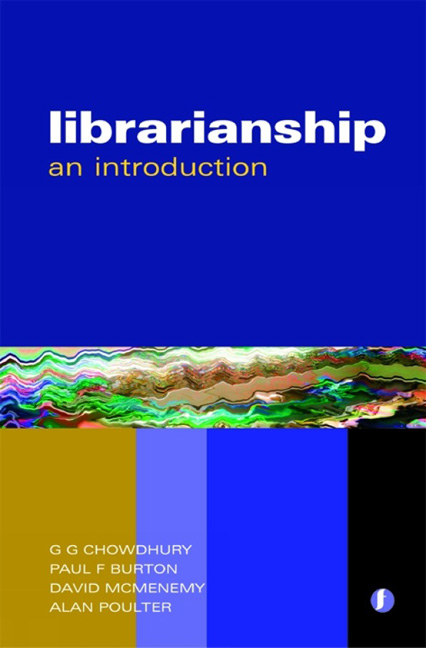Book contents
- Frontmatter
- Contents
- Preface
- Acknowledgements
- 1 Introduction
- Part 1 Libraries and information services: evolution or revolution?
- Part 2 Library and information resources and services
- 6 Content, storage and delivery
- 7 Library services
- 8 Collection management and collection development
- 9 Preservation and digitization
- Part 3 Information organization and access
- Part 4 Library and information users and society
- Part 5 Library technologies
- Part 6 Management and marketing in libraries
- Part 7 Education and research in librarianship
- Epilogue
- Glossary
- Resource list
- Index
6 - Content, storage and delivery
from Part 2 - Library and information resources and services
Published online by Cambridge University Press: 08 June 2018
- Frontmatter
- Contents
- Preface
- Acknowledgements
- 1 Introduction
- Part 1 Libraries and information services: evolution or revolution?
- Part 2 Library and information resources and services
- 6 Content, storage and delivery
- 7 Library services
- 8 Collection management and collection development
- 9 Preservation and digitization
- Part 3 Information organization and access
- Part 4 Library and information users and society
- Part 5 Library technologies
- Part 6 Management and marketing in libraries
- Part 7 Education and research in librarianship
- Epilogue
- Glossary
- Resource list
- Index
Summary
Introduction
Writing in 1974, Atkinson suggested that solely the love of books was no longer an acceptable reason to wish to be a librarian. He stressed that, ‘For some considerable time now, that reason, alone and unqualified, has not been enough’ (Atkinson, 1974, 54). Yet even at the time of writing this book in 2007, this response is still a common one from applicants to librarianship courses who are asked why they wish to become a librarian. Atkinson went on to suggest that librarians ‘have long wished to change a popular image of themselves as effete, browsing booklovers’ (Ibid.).
The reality is that libraries have been about more than books for a long time, indeed for as long as libraries have existed there have been ephemeral items that were not books, such as manuscripts, pamphlets and the like. In the 21st century non-book material makes up a large proportion of library holdings for many institutions, and indeed the concept of the digital library, discussed in Chapter 20, is all about the electronic rather than the physical item. Therefore Atkinson is correct that love of the book as a format for delivery of content is not in and of itself a reasonable unqualified basis for wishing to pursue a career in libraries; but love of the content within regardless of format, and an associated desire to deliver that content to as many users as possible, certainly is. In the modern library the book is one of many formats that a library user may wish to consult, and modern librarians must be familiar with and value all equally if they are to deliver excellent service.
This chapter will discuss the range of materials now housed within libraries, and some of the challenges they present in terms of access and storage.
Delivery formats
Information, be it a fiction book, a reference book, a journal, a newspaper or a computer file, needs to be presented to users in a format that enables them to access the content. The format of delivery of information will govern how easy it is for them to access, how long it will take, and whether they require an intermediary or a specialist piece of equipment.
- Type
- Chapter
- Information
- LibrarianshipAn introduction, pp. 49 - 54Publisher: FacetPrint publication year: 2007



